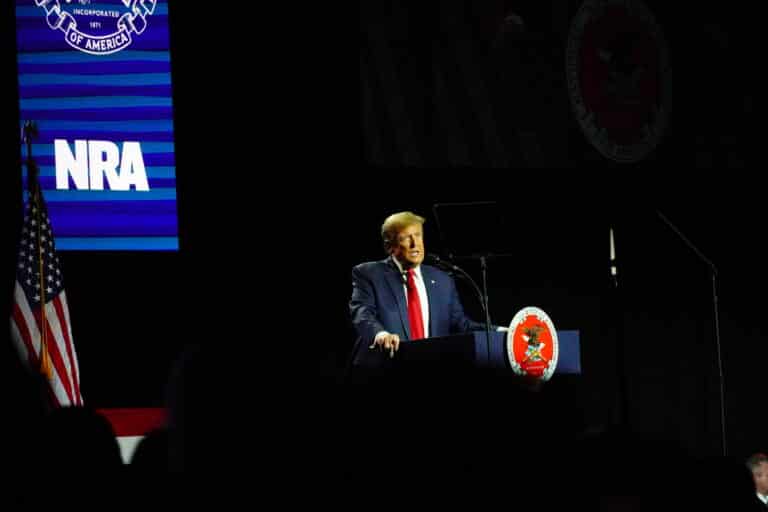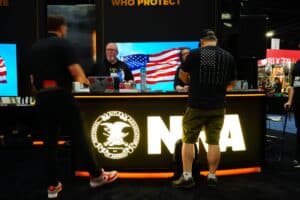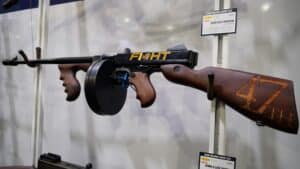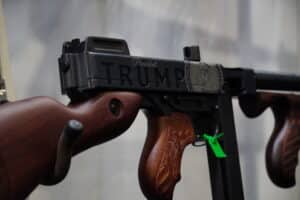Faced with the first high-profile shooting of his second term, Donald Trump bucked initial calls for new gun restrictions.
After a 20-year-old student at Florida State University shot and killed two people on campus Thursday and injured six others, the President was asked by reporters in the Oval Office if the incident would prompt him to support any new gun legislation. While he called the attack a “shame,” he blamed the perpetrator rather than their weapons.
“These things are terrible, but the gun doesn’t do the shooting. The people do,” Trump said. “It’s, you know, a phrase that’s used probably too often. I will tell you that it’s a shame.”
He said his administration would “have more to say about it later,” but added that he had no plans to support new gun laws.
“As far as legislation is concerned, this has been going on for a long time,” he said. “I have an obligation to protect the Second Amendment. I ran on the Second Amendment, among other things, and I will always protect the Second Amendment.”
Though a Republican politician stiff-arming calls for stricter gun laws after a shooting is not exactly an atypical occurrence in American politics, Trump is far from the traditional Republican. He has gone further to connect with gun-rights activists than previous Republican presidents by doing things like speaking at the NRA’s annual meetings–at least until this year. But he has also deviated from staunch pro-gun messaging in the aftermath of precisely these types of major public shooting incidents, especially during his first term in the White House.
Following the 2018 Parkland shooting, he publicly considered backing “red flag” legislation, declaring at the time his preference to “take the guns first, go through due process second” in a moment that has become infamous among some gun-rights advocates. In the aftermath of the 2019 El Paso shooting, he reportedly flirted with supporting an “assault weapon” ban behind closed doors, according to the New York Times. He also allegedly floated expanding background checks and raising the age to purchase any gun to 21 after both incidents, according to the Times.
When a gunman wielding a suppressor-equipped handgun murdered 12 people at a municipal center in Virginia Beach in 2019, Trump toyed with the idea of outlawing them in public media interviews. Perhaps most notably, he unilaterally implemented a total ban on bump stocks via ATF rulemaking after the 2017 Las Vegas shooting. At least until the Supreme Court struck down the policy last year.
By contrast, Trump’s initial comments in the wake of the FSU shooting leave no space for new gun control. They’re also in line with his response to being shot in the ear by an AR-15-wielding attempted assassin at a campaign event last summer.
Of course, it’s still too early to say whether that will hold throughout his remaining tenure, and there are at least some reasons to think that the FSU shooting may not be as trying a test as those he faced in his previous term.
It’s an unfortunate and grisly fact that attention and pressure for new gun laws in the aftermath of public shooting incidents tend to scale with body count. The Florida State shooting appears to have claimed two lives thus far, which is still horrible. However, it may not present the same pressure point that the Parkland or Las Vegas shooting did–though the presence of Parkland survivors on the FSU campus during the shooting could result in added attention and political pressure.
It’s also not clear, at least based on preliminary reports from the early investigation into the shooting, what new gun laws would potentially intersect with the incident.
The shooter carried out his attack with a handgun and a shotgun, firearms without any sizeable ban-supporting constituency like the AR-15 or other so-called assault weapons. The attack took place on a college campus where Florida law already prohibits the carrying of firearms. The shooter was also 20 years old, meaning he was both too young under federal law to legally acquire a handgun from a firearms dealer and too young to purchase other firearms under Florida’s post-Parkland 21-year-old minimum age requirement for gun sales.
Finally, the shooter also reportedly sourced at least the handgun used in the attack from his mother, who is an active law enforcement officer. While that raises some potential questions about weapons storage and shared access, law enforcement officers tend to be exempt from even the most restrictive gun-control regimes in the country.
Gun-control groups have tried to turn the political heat up on Trump to do something. But the more limited death toll relative to other mass shootings and lack of obvious gun policy flashpoints likely keeps the pressure relatively low given the circumstances.
Regardless, Donald Trump resisted the initial call for new gun restrictions in the first real test of his second term. That should reassure gun-rights advocates while frustrating gun-control supporters. At least, for now.






